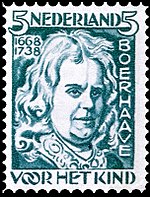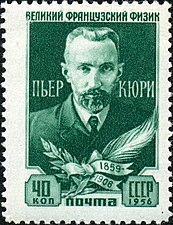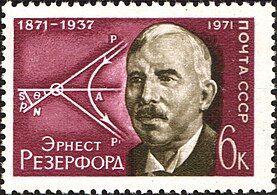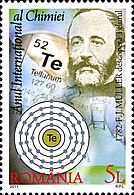

The depiction of chemistry on stamps began in 1923 with the issue of a set of definitive French stamps commemorating the chemist and microbiologist Louis Pasteur.[1] Another early chemical stamp depicted the botanist and chemist Herman Boerhaave.[2] The depiction of chemistry on stamps contributes to chemical education[3][4] and to the public understanding of science.[5][6]
Scope
[edit]A chemical stamp has one or more of the following characteristics:
- It depicts a chemist, or a polymath who did significant work in the chemical field
- It depicts a chemical concept, such as the periodic table, or a chemical object, such as laboratory glassware
- It depicts a chemical element,[7] atom,[8] molecule, symbol or formula
- It commemorates a chemistry event, such as an international congress, or an international year in the chemical field[9]
- It celebrates the jubilee of a chemistry institution, such as IUPAC or the American Chemical Society[10]
- It depicts the process of chemistry education, or a building used primarily for chemistry research or education
Stamps may depict a specific area of chemistry such as physical, analytical,[11] spectroscopic,[12] organic,[13] or inorganic.
The following types of material are excluded (although they may also be collected by chemical stamp enthusiasts):
- Postal stationery,[14] e.g. a postcard depicting a chemist with a non-chemical stamp affixed
- Cinderella, local, private or personal issues, i.e. unofficial stamps
- Non-postal stamps, e.g. revenue stamps[15]
- Stamps issued by non-existing/unrecognized countries and/or in excess of actual postal requirements
Examples
[edit]Chemists
[edit]-
Alfred Nobel, Sweden, 1946
-
Pierre Curie, USSR, 1956
-
Dmitri Mendeleev, USSR, 1969
-
A.I. Virtanen, Finland, 1980
-
Marie Curie, Albania, 1989
Stamps depicting individual chemists are often issued by countries to commemorate the birth or death anniversaries of their significant national chemists,[16] for example stamps issued by Russia celebrating Dmitri Mendeleev. Examples are illustrated in the gallery above. Some countries have also issued stamps depicting internationally famous chemists such as Marie Curie[17][18] or Alfred Nobel.
Chemical concepts and objects
[edit]-
Chemical industry, USA, 1951
-
Rutherford Scattering, USSR, 1971
-
Laboratory glassware, USA, 1976
-
Nuclear fission, Germany, 1979
Stamps depicting a chemical concept or object, sometimes combined with a portrait of the chemist responsible for inventing the concept or object, are generally issued as commemorative stamps rather than definitive stamps. Examples are shown in the gallery above: a 1951 American stamp illustrating chemical industry and also celebrating the diamond jubilee of the American Chemical Society,[10] a 1971 Russian stamp illustrating Rutherford Scattering, a 1976 American stamp depicting Laboratory glassware, and a 1979 German stamp illustrating nuclear fission and also commemorating Otto Hahn's 1944 Nobel prize in chemistry.
Chemical elements, symbols, formulae, organisations and events
[edit]-
Benzene, Germany, 1964
-
IUPAC, USSR, 1965
-
Gold, Uzbekistan, 2008
-
Tellurium electron shell, Romania, 2011
-
International Year of Chemistry, Indonesia, 2011
Stamps depicting a chemical symbol or formula are frequently depicted together with the chemist they are primarily associated with. Examples are shown in the gallery above: a 1964 German stamp illustrating the benzene structure associated with August Kekulé, a 1965 Russian stamp commemorating the 1965 IUPAC meeting in Moscow, a 2008 Uzbeki stamp illustrating the element gold, a 2011 Romanian stamp depicting the electron structure of Tellurium and the chemist F.J. Müller, and a 2011 Indonesian stamp issued for the International Year of Chemistry.
Publications
[edit]The chemists Edgar Heilbronner and Foil Miller published the book A philatelic ramble through chemistry in 1998 (reissued in 2004)[19] which was well reviewed.[20][21][22][23] Prior to this, Foil Miller and George Kauffman had published a series of articles on Alfred Nobel, and on Nobel Laureates in Chemistry in The Journal of Chemical Education.[24][25][26][27]
Daniel Rabinovich is the current leading writer in the field having published articles on the International Year of Chemistry,[17] the International System of Units,[28] the International Year of the Periodic Table,[29] Roald Hoffmann,[30] and also making presentations on the subject to chemistry departments and at chemistry conferences.[31]
The Chemistry and Physics on Stamps Study Unit (CPOSSU) of the American Topical Association has published a members' journal Philatelia Chimica et Physica since 1979.[32]
Listings of new issues of chemical stamps are included in the monthly Scott Stamp magazine and in Linn's Stamp News; they are also available online from October 2010 to date in the Science & Technology section.[33]
References
[edit]- ^ Klickstein, Herbert S.; Leicester, Henry M. (1947). "Philately - A Chapter in the History of Chemistry". Journal of the History of Medicine and Allied Sciences. 2 (3): 337–378. doi:10.1093/jhmas/ii.3.337. PMID 20266807.
- ^ Schaeffer, H.F. (May 1934). "Philately serves chemistry". Journal of Chemical Education. 11 (5): 259-266. Bibcode:1934JChEd..11..259S. doi:10.1021/ed011p259.
- ^ Rappoport, Zvi (1992). "Chemistry on Stamps (Chemophilately)". Accounts of Chemical Research. 25: 24-31. doi:10.1021/ar00013a004.
- ^ Schreck, James O. (April 1986). "Postage Stamps as a Teaching Tool in Chemistry". Journal of Chemical Education. 63 (4): 283-287. doi:10.1021/ed060p128.
- ^ Yardley, Christopher B. (2015). The representation of science and scientists on postage stamps (PDF). Canberra: ANU Press. ISBN 978-19250-2178-3.
- ^ Krall, Madison A.; Parks, Melissa M.; Krebs, Emily; Mann, Benjamin W.; Maison, Kourtney; Jensen, Robin E. (2022). "Chemistry in the mail: Stamps from around the globe and public science communication in the twentieth century". Public Understanding of Science. 31 (2): 136–151. doi:10.1177/09636625211032465. PMID 34319183.
- ^ Norkus, Povilas; Norkus, Eugenijus; Vaitaitis, Albert P. (2007). "Chemistry in philately 1. Symbols of chemical elements". Chemija. 18 (4): 21-33.
- ^ Morgan, Michael A. (2006). "A Postage Stamp History of the Atom, Part II: The Quantum Era". Philatelia Chimica et Physica. 28 (1): 35-43.
- ^ Rabinovich, Daniel (2014). "The International Year of Crystallography (2014): A Philatelic Celebration". Chemistry International. 36 (6): 39-42. doi:10.1515/ci-2014-0636.
- ^ a b Lovell, Jeffrie H. "American Chemical Society Issue". Smithsonian National Postal Museum. Retrieved 13 August 2024.
- ^ Ullman, Alan H. (June 1982). "Analytical Chemists on Postage Stamps". Analytical Chemistry. 545 (7): 780A–785A. doi:10.1021/ac00244a001. PMID 7049000.
- ^ Miller, Foil A. (May 1983). "The History of Spectroscopy as Illustrated on Stamps". Applied Spectroscopy. 37 (3): 219-225. Bibcode:1983ApSpe..37..219M. doi:10.1366/0003702834634488.
- ^ Schreck, James O. (August 1989). "Organic Chemistry on Postage Stamps". Journal of Chemical Education. 66 (8): 624-630. Bibcode:1989JChEd..66..624S. doi:10.1021/ed066p624.
- ^ Miller, Rick (14 January 2012). "Postal stationery offers collecting variety". Linns Stamp News. Retrieved 8 May 2024.
- ^ Mackay, James (2003). Philatelic Terms Illustrated (4th ed.). Stanley Gibbons Limited. p. 170. ISBN 9780852595572.
- ^ Caswell, Lyman R. (October 1990). "American Chemists and Physicists on Postage Stamps". Journal of Chemical Education. 67 (10): 842-847. Bibcode:1990JChEd..67..842C. doi:10.1021/ed067p842.
- ^ a b Rabinovich, Daniel (2011). "An IYC Philatelic Tribute to Marie Curie". Chemistry International. 33 (6): 44-45. doi:10.1515/ci.2011.33.6.44.
- ^ "Marie Curie on stamps". allaboutstamps.co.uk. 26 November 2018. Retrieved 2024-08-12.
- ^ Heilbronner, E.; Miller, F.A. (2004). A philatelic ramble through chemistry. Zürich: Wiley-VCH. p. 268. ISBN 3-906390-31-4.
- ^ Rabinovich, Daniel (August 1998). "Book & Media Reviews: A Philatelic Ramble through Chemistry". Journal of Chemical Education. 75 (8): 958. doi:10.1021/ed075p958.
- ^ Doumas, B. T. (11 November 2004). "A Philatelic Ramble through Chemistry by E. Heilbronner and F.A. Miller". Clinical Chemistry. 51 (1): 279–280. doi:10.1373/clinchem.2004.035626.
- ^ Craig, Peter J. (2005). "Book Review: A philatelic ramble through chemistry". Applied Organometallic Chemistry. 19: 220. doi:10.1002/aoc.769.
- ^ Sharkey, John B. (2005). "Book Reviews: A Philatelic Ramble through Chemistry" (PDF). Bulletin for the History of Chemistry. 30 (1). American Chemical Society: 51-53.
- ^ Miller, Foil A.; Kauffman, George B. (October 1988). "Alfred Nobel and Philately: The Man, His Work, and His Prizes". Journal of Chemical Education. 65 (10): 843-846. Bibcode:1988JChEd..65..843M. doi:10.1021/ed065p843.
- ^ Miller, Foil A.; Kauffman, George B. (June 1990). "Nobel Laureates in Chemistry - A Philatelic Survey. Part I. 1901-1910". Journal of Chemical Education. 67 (6): 451-456. Bibcode:1990JChEd..67..451K. doi:10.1021/ed067p451.
- ^ Miller, Foil A.; Kauffman, George B. (July 1990). "Nobel Laureates in Chemistry - A Philatelic Survey. Part II. 1911-1934". Journal of Chemical Education. 67 (7): 569-574. Bibcode:1990JChEd..67..569K. doi:10.1021/ed067p569.
- ^ Miller, Foil A.; Kauffman, George B. (September 1990). "Nobel Laureates in Chemistry - A Philatelic Survey. Part III. 1935-1988". Journal of Chemical Education. 67 (9): 774-781. Bibcode:1990JChEd..67..774K. doi:10.1021/ed067p774.
- ^ Rabinovich, Daniel (2010). "A Philatelic Tribute to the SI". Chemistry International. 32 (6): 4-5. doi:10.1515/ci.2010.32.6.4.
- ^ Rabinovich, Daniel (2019). "IYPT and The Mother of All Tables". Chemistry International. 41 (4): 60-62. doi:10.1515/ci-2019-0433.
- ^ Rabinovich, Daniel (2017). "Roald Hoffmann: Around the World in Eighty Years" (PDF). Philatelia Chimica et Physica. 38 (4): 144-148.
- ^ Rabinovich, Daniel (2011). "Hydrogen to Copernicium: Postage Stamps as Cultural Icons in the IYC" (PDF).
- ^ "PCP Index to Volumes 1-20 (1979-1998)" (PDF). CPOSSU. Retrieved 2024-08-12.
- ^ "Stamp programs: by topic". Linn's Stamp News. August 2024.
External links
[edit]- Rabinovich, Daniel (2020). The world of chemistry on postage stamps














